CPS Grad Spotlight - Zheng Zhang

Name: Zheng Zhang
MSc or PhD Candidate: PhD Candidate
Location of Undergraduate Education: Beijing Normal University
Name of the Lab at CPS: Milstein Lab
Select Awards: CPS Teaching Fellowship Award
Selected Research Contributions:
Z. Zhang and J. N. Milstein, Extending the photobleaching lifetime in the presence of an optical tweezers by wavefront engineering, 2020 J.Opt. 22 095301
Z. Zhang and J. N. Milstein, Extending the Range of Rupture Force Measurements with Axial Optical Tweezers, in preparation.
Z. Zhang and J. N. Milstein, Increasing Rupture Force between Short Complementary Strands of DNA with Single Strand Segment, in preparation.
Zheng, please tell us about yourself and your journey as a PhD Candidate!
How did you come to UTM? What interested you to join a lab here?
For me as a student in experimental biological physics, UTM CPS is a very multidisciplinary department. It will be good to be in Physics department to learn about all the cool things in other fields of physics, but it is even more helpful to be around people who are doing research that is more relevant to yours. Here I have the chance to talk to people from the biology and chemistry department and collaborate with them very conveniently, which inspired many cool ideas in my own research. Also, we have easy access to all the equipment that is necessary for biophysics study here. I personally think it is better for people like us who are doing interdisciplinary research.
When did you realize that you wanted to pursue a graduate study?
Like many of my colleagues, I also think doing research in science is a cool thing. I’m actually more interested in exploring the world and nature than making a lot of money. It would be even much better if my exploration could benefit others. Thus, I think doing research in science, especially biological physics, is a perfect match for me because there are so many puzzles in biology to solve that are important to human health. I first started with Prof. Ping Sun during my undergraduate study, where I investigated how to increase the precision of optical parameters calculated by Kramers–Kronig relations.
Under her instruction, both academically and mentally, I started to enjoy the excitement of solving scientific problems and decided to continue as a graduate student. In my opinion, interest is really the best driving force in your life. I have to admit that different people have different understandings of how they want to live their life, but for me, doing research that can explore nature and help other people is the thing I love.
What are your research interests? Tell us few exciting things about your research.
As for my research, I use optical tweezers to investigate properties of biological molecules. The most exciting thing about my research is that with optical tweezers, we have a handle to manipulate the microscopic world with a precision of nanometer. The microscopic world is a completely new thing to me. It is already exciting to just observe it, but we can even manipulate it, such as moving things around and changing the structure of single molecules.
With this tool, we can investigate physical properties of different molecules. In my research, I investigated the rupture force to break complementary DNA strands. We found that a small segment of single strand DNA will increase the rupture force, which means the binding get stabilized. It is exciting that even for molecules as common as DNA, we can still find something new from it that might be useful for other people.
What is your goal when you finish your degree?
I think I will continue doing research. Most likely finding a place for a postdoctoral position to continue research. I might try different fields from my current one. The more you learn, the more things you can do. I think it is always good to challenge yourself.
What are some of your achievements you'd like to share?
It is good that I have the chance to do experiments in different directions in Milstein Lab. I started from creating an area with less laser intensity in optical tweezer to extend photobleaching lifetime, and we showed that with a first order Laguerre-Gaussian beam, we can create a donut-shaped optical trap with a low laser intensity region in the center that we can do fluorescent measurements. Later, we started research on axial optical tweezers and showed that with appropriate correction, it can be used to measure forces over 70pN. We also investigated binding strength of DNA as explained above. We also collaborate with Prosser Lab to investigate binding strength between GPCRs and G-protein.
Do you have any advice for students considering to pursue graduate studies in research?
I think interest is very important, especially when you are choosing your direction. It is a long battle, and whether you are interested in what you are doing will significantly determine whether you will enjoy your graduate life or not.
Also, as an international student, I have to say that for students like me who are far away from home, I think whether you can get mental and social support from working place is also important when choosing a place for graduate study. Mental stress is very normal for international students, especially when we are new here. CPS is full of people from all over the world, and the atmosphere here is relaxing and supportive. We constantly have social events that connect people together. All these helped me a lot when I was new here. I think this is also an important factor to consider when doing research abroad, and I’m glad that CPS did it very well.



